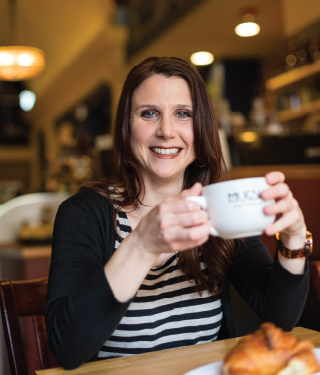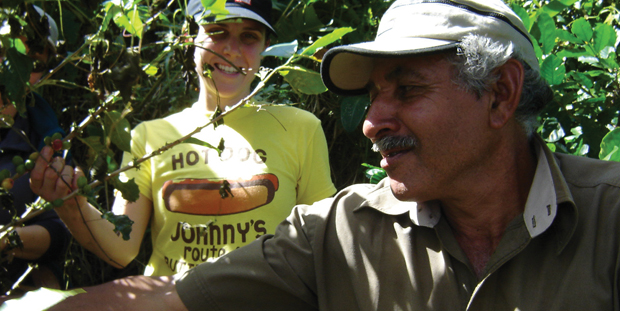
B Corps: Better to the Last Drop
Corporate America is as obscure as electricity when you’re gazing through the clouds at the Isabella Dariense Mountain Range in the Jinotega region of Nicaragua. Here, where unemployment peaks near 50 percent and the only running water is of the tidal variety, coffee prevails. The rich, volcanic soil and sultry climate collaborate to produce some of the most fragrant, brightly acidic beans in the world. A single crop can yield a solid year of income for a farming family.
The cycle begins when a farmer snaps a coffee cherry from the branch. Once harvested, the beans are extracted, cleaned, sorted, graded, aged, bought and consumed. Most coffee drinkers don’t consider the farmer, his family, or his community. Or whether he was compensated fairly for his product. But Angela Vendetti ’99 does. In fact, she knows their names.
For nearly a decade, Vendetti, a Bucks County, Pa., native who majored in international business and marketing, has committed herself and her livelihood to reforming society’s notion of “good business” — and she’s doing it in the shadow of a former prison. Vendetti opened Mugshots Coffeehouse and Cafe, one of Philadelphia’s most cherished caffeine dens, across the street from Eastern State Penitentiary in January 2004. This was before the crash — before Corporate America was taken to task for putting the bottom line above the greater good.
To Vendetti, 35, considering the greater good has always meant considering the folks picking her coffee with the same devotion as the folks who drink it. The question was never about jobs vs. the environment, or people vs. profit. Vendetti has valued them all equally for as long as she can remember. When she was 12, she sent a letter to the editor of the Bucks County Courier Times in response to an editorial pitting jobs against the environment. “If you really care about your grandchildren, you’ll care more about the environment,” she wrote.
Today, Vendetti’s tune hasn’t changed a bit: “It’s like, ask the real questions,” she says. “Let’s approach this from a point of view that is fair for everybody. It’s people, planet and profit. Why is this even a debate? They all matter.”
Vendetti is a social entrepreneur with an incredible talent for bringing people together. She’s a member of the Greater Philadelphia Chamber of Commerce and the Sustainable Business Network — a local organization committed to building a green economy. She is also involved with the Fairmount Community Development Corporation, and she played a role in forming the Greater Art Museum Business Association, which includes the Brewerytown, Spring Garden, Fairmount and Francisville neighborhoods of Philadelphia. Lee Iacocca once said that, in the end, there can only be one guy in a corporation — the CEO. Vendetti begs to differ. It’s not about one. It’s about all — from customer to currency to chicken to egg to soil and back again in a cycle that, when functioning properly, is self-sufficient.
Mugshots’ flagship location on Fairmount Avenue (there is another location on Girard in less-gentrified Brewerytown) is a hipper, more subtly colored Central Perk, the iconic gathering place on NBC’s Friends. Local musicians serenade crowds on weekends. There are wine and cheese nights featuring an assortment of vintages from Chester County’s Paradocx Vineyard. From the beginning, the plan was for Mugshots to be a gathering place for the local community.

“I try to get involved with everyone around me,” Vendetti says. “I want people to recognize that I’m not just in it for the money. I’m in it for the community. I live here.”
Vendetti’s regulars are a healthy cross-section of working Philadelphia. Many aren’t aware that the desserts are vegan, the coffee is direct-trade, the sandwiches and dairy are sourced from local farms and the electricity is powered by wind. Her customers don’t see the compost bucket behind the baristas — where coffee grounds, tea and food scraps are saved for a Friday pickup by Lancaster County’s Green Meadow Farm. Most aren’t aware that the compost will return next year — in a sense — when Green Meadow makes one of its deliveries of fresh cheeses and bacon.
You have to pay close attention to see all the vital forces of sustainability at work. Otherwise, it’s just a business. And Mugshots isn’t a normal business.
Mugshots is part of a movement of likeminded companies — including philanthropic eyewear designer Warby Parker and California-based outdoor clothing outfitter Patagonia — that are legally protected and empowered to consider people and planet on par with profit. They’re called Benefit Corporations, and they are going to change the way we think about business.
What does it mean to be a Benefit Corporation? “It means that I look at everything,” Vendetti says. “The local economy. Community. Employees. Competitors, even. It’s about employee retention. It’s franchising. Farmers. Brewers. Artists.
“And profit, too,” she adds. She enunciates profit with a smile, but not in a way that implies money as postscript. Profit still matters, she says. This is a business of course. Mugshots was profitable almost immediately, though — not despite being a sustainable business, but because of it. Sustainability has been Vendetti’s greatest marketing advantage since day one. It was built into the business plan.
Mugshots became a founding Benefit Corporation in 2006 and registered as a certified B Corp in January 2013. Chances are you have never heard of Benefit Corporations and B Corp certification. These designations are so new that they are often confused for each other. Reporters have defined them incorrectly. There have been no long-term economic impact studies. But there will be.
The “B-movement” is the brainchild of three ex-Stanford University roommates and entrepreneurs — who in 2006 founded B Lab, a 501(c)3 non-profit headquartered in Wayne, Pa. The idea was to use businesses — the most powerful entities in America — to drive social and environmental change. Before B Lab, social and environmental issues were almost exclusively viewed as concerns for government agencies and nonprofits. Yet, working with corporate lawyers, B Lab was able to develop a blueprint for a new kind of business that is built to care. They call them Benefit Corporations.
A Benefit Corporation is a form of structuring a company (like S and C Corporations) that requires a business to incorporate environmental and social objectives into its bylaws. Unlike S or C Corporations, though, Benefit Corporations owe a legal commitment to shareholders to consider more than dollars and cents; they must commit to the triple-bottom-line of people, profit and planet. Benefit Corporations can also seek B Corp certification from B Lab based on a 200-point “B Impact Assessment” that measures the public benefit of a company’s operations. B Corp certification is like LEED certification for Corporate America, but instead of assessing a physical structure, B Lab assesses everything. Benefit Corporations must score an 80 out of 200 in order to receive certified B Corp status. Once certified, B Corps can access B Lab’s suite of support services — including sales, marketing, fundraising, financial planning and networking resources. A certified B Corp is a company that is contractually committed to care — and can prove it through audits and annual reports.
Think corporate social responsibility, social entrepreneurship and socially responsible investing — hopped up on organic, grass-fed steroids.
Last year, Pennsylvania became the 12th state to pass a “B-Corps Bill.” The legislation made it possible for Vendetti to officially register as Pennsylvania’s third certified B Corp. Through the legislation, Mugshots and 24 other certified B Corps in Pennsylvania were extended a $4,000 tax credit by the Pennsylvania Office of Sustainability. The law even cited B Corp certification as “prima facie evidence” of a business’ sustainability.
When similar legislation was introduced in North Carolina in 2011, A.P. Carlton, former president of the American Bar Association, called the bill “the first real original, constructive thought anyone has had in the corporate governance world in about 25 years.”
Today, there are more than 737 Benefit Corporations in 24 nations worldwide. Sixteen states have passed B Corp laws and another 12 have introduced legislation. Since the crash of 2008, the movement has grown exponentially. Twice as many B Corps were certified in the first half of 2010 as in the first half of 2009.

Vendetti has been on board with the triple-bottom-line philosophy from the beginning. Mugshots’ first marquee act of sustainability — the big commitment to planet — was fair trade coffee, which Vendetti purchased through Equal Exchange. Today, Mugshots’ constantly rotating menu of roasts comes via Counter Culture, a direct trade coffee supplier. Why? “Because direct trade gives us more of a one-on-one relationship with the farmers,” Vendetti says. Direct trade suppliers target individual farmers who grow exceptional product, which means they’re willing to pay higher than fair trade prices. And despite the higher costs, Vendetti still manages to keep the price of a small coffee at a competitive $1.90.
Then there is the food. Vendetti purchases all produce, cheese, dairy, meat and grain from local, organic farms, which not only supports the local economy — it reduces the use of fuel for delivery. Vendetti has built working relationships with distributors and cooperatives that give her access to hundreds of local farmers.
Mugshots is also powered by 100 percent wind energy through Clean Currents, another certified B Corp. The rates are competitive with PECO, Vendetti says. “And no, there isn’t a windmill on the roof.”
Vendetti has consistently paid her employees — her people -— higher than minimum wage, with sales incentives for completing training programs through Counter Culture that teach coffee extraction, science and hardware maintenance. She offers a health insurance plan and a personal 401(k) that all full-time employees can opt into through her insurance provider. It’s not just for an assessment; it’s because well-trained, well-treated employees perform better.
Vendetti keeps prices down through portioning and consistency, which is as important to the customer experience as it is to the bottom line.
“If you over-serve, there goes your margin,” she says. “Our cost of goods is generally at around 35 percent. We used to be at 38 percent. When bacon prices go up, we reduce the portion size to keep the price down.”
The Benefit Corporation model has naysayers. How can there be any other bottom line than profit, they ask? And even if the model works for small businesses in niche markets, how could it ever work for the Fortune 1000 sect? It’s idealism. Naive altruism. Or just plain bad business. Because money isn’t just the all-mighty means of the market system: it’s also the end.
Vendetti understands the argument. And if she could address all opposition to the B Corp ethos, she might say something like this: Have you ever been to Nicaragua?
In 2005, Vendetti spent 10 days picking coffee cherries on the side of a mountain in Matagalpa, Nicaragua, with a fair trade farmer named Don Wilfredo Herrera Mendoza. Vendetti had opened Mugshots just six months prior. Business had been good — great, even. But it was her time on the mountain that truly made her business plan come to life.
Vendetti smelled the soil, drank the water and took showers in a rain barrel using a bowl for a spigot. She met women in the village who started a savings and loan program to diversify their income. She witnessed the opening of a church and the re-opening of a school. This was the triple-bottom-line in full stride.
“I came back from Nicaragua with a renewed sense of purpose,” Vendetti says. “It was clarified.”
Is it possible to truly connect a farming community in Central America with a business in Philadelphia across lines of profitability and sustainability? Can all of Vendetti’s sustainable enterprises really make a difference? Sure. Vendetti has proven that already. In April, Mugshots received a Best Brew Award from KRUPS USA for being voted the best coffee shop in Philadelphia (it tied with Naked Chocolate Café). This year, Vendetti will turn another profit while staying true to the triple-bottom-line. The cycle will continue.
But what happens if the CEO of a multinational corporation attempts to commit funds to a social initiative that falls just askew of the bottom line? Under all conventional corporate structures, that’s akin to theft.
Corporate America will decide whether the B Corp movement reaches adolescence. It will decide if structuring big business for the greater good can drive lasting social and environmental change — or if doing so will just remake people and planet in profit’s image.
With visionaries like Vendetti who are willing to set the example on board, B Corps might just have a shot.
“I want to help other people run their own triple-bottom-line businesses,” Vendetti says, “whether that’s a Mugshots franchise or something else entirely. Let’s be innovative. Do something good in the world and make money at the same time.”
Take note, Big Business. It’s about to get personal.


